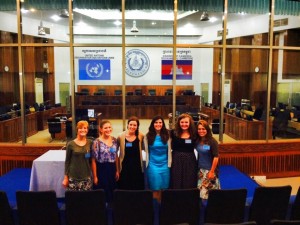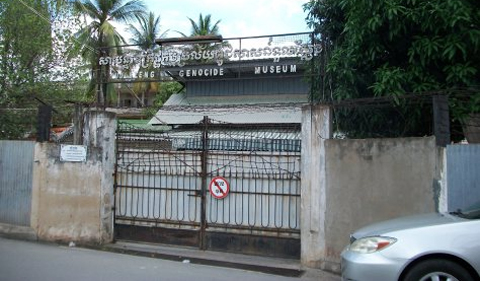By Katie Conlon ’16, Elizabeth Cychosz ’15, Danielle Fultz ’14, Samantha Rommel ’15, Bekki Wyss ’15
Imagining International Justice in Post-Genocide Cambodia
Because all of our projects relate in some way to the Khmer Rouge Tribunal, or the Extraordinary Chambers in the Courts of Cambodia (ECCC for short), we have been looking forward to visiting the facilities just outside Phnom Penh. Last Friday, we finally had our chance to buckle down for the dusty, one-and-a-half hour tuk-tuk ride from the south side of the city to the west side in order to meet with representatives from all of the court offices.
We want to give a shout out to Madeleine Willis, an intern in the public affairs office, who graciously helped us coordinate this intensive day, scheduling back-to-back meetings and shifting things around when our questions went over the allotted time. Thank you for being so wonderful!
The EC CC was officially formed in 2003, after the Royal Government of Cambodia and the United Nations General Assembly reached an agreement establishing it as a “hybrid” tribunal. In this case, hybrid means that there are two kinds of authority at each stage of the court proceedings: international and national. This means that the court is staffed with a mix of Cambodians and people who have experience from other international tribunals. The ultimate aim of this model is to balance international interests with the priorities of Cambodians, both survivors and those who work within the domestic legal system.
CC was officially formed in 2003, after the Royal Government of Cambodia and the United Nations General Assembly reached an agreement establishing it as a “hybrid” tribunal. In this case, hybrid means that there are two kinds of authority at each stage of the court proceedings: international and national. This means that the court is staffed with a mix of Cambodians and people who have experience from other international tribunals. The ultimate aim of this model is to balance international interests with the priorities of Cambodians, both survivors and those who work within the domestic legal system.
The tribunal has jurisdiction from April 17, 1975 to January 6, 1979 to try two kinds of defendants: the senior leaders of Democratic Kampuchea (the government established by the Khmer Rouge) and those believed to be most responsible for grave violations of national and international law.
So far, the ECCC has issued one verdict in Case 001, sentencing Kaing Guek Eav (alias Duch) to life in prison for war crimes and crimes against humanity committed at S-21. Right now, Nuon Chea and Khieu Samphan are on trial in Case 002 for war crimes, crimes against humanity, and genocide. Cases 003 and 004 are under investigation.
The tribunal wasn’t established until 30 years after Democratic Kampuchea fell in 1979, and these men and women who are on trial are in their 80s. Case 002 originally had four defendants, but husband and wife Ieng Sary and Ieng Thirith are no longer being prosecuted. Ieng Thirith, who suffers from dementia, was declared unfit to stand trial in 2012 and Ieng Sary died in May 2013. Many people fear that the tribunal is taking too long and its scope limits who can be prosecuted.
We won’t bore you with all of the details of the tribunal’s structure, but if you are interested in learning more check out this video from the ECCC’s website.



















Comments